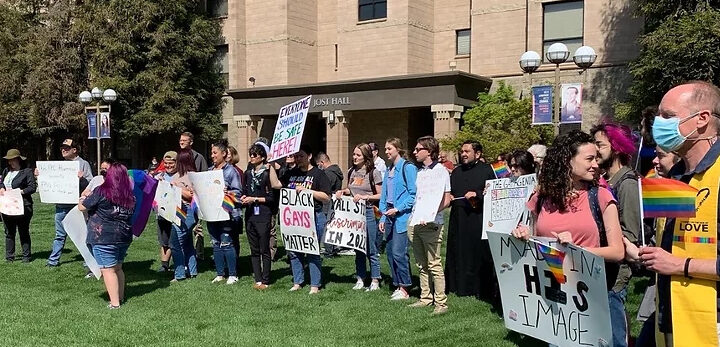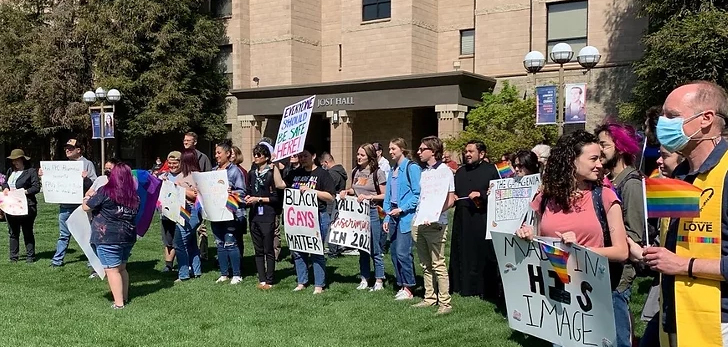An advocacy group for more than 30 LGBTQ students marginalized by religious colleges and universities will continue the struggle for justice after the recent dismissal of its class action lawsuit against three Christian colleges and universities and the federal government.
The Religious Exemption Accountability Project filed suit in 2021 to declare as unconstitutional the religious exemption provision of Title IX, the 1972 civil rights law prohibiting discrimination based on sex by educational institutions that receive federal funding. The suit’s 2023 dismissal by a federal judge in Oregon was upheld by the Ninth Circuit Court of Appeals Aug. 30.
Defendants included the U.S. Department of Education, Corban University in Oregon, William Jessup University in California, Phoenix Seminary in Arizona and the Council for Christian Colleges and Universities. The suit claimed the religious schools used the religious exemption provision to discriminate against nonbinary, gay, lesbian, bisexual and transgender people.

Erin Green
REAP Director Erin Green said the organization will back whatever action plaintiffs and their attorneys consider appropriate in the wake of the appellate court’s decision. She would not say if more litigation is coming.
“REAP will continue to support the plaintiffs and tell their stories about the abuse and discrimination that they have endured both by their non-affirming religious colleges and on the part of the DOE,” she said.
The group also affirmed its belief in incremental change over decades with wins and losses to be endured along the way, and that it will continue to fund intercollegiate support groups for LGBTQ students in schools that use religion to violate Title IX.
“We must protect students on campuses even if the law will not. It is imperative that we push back on this decision and continue to lay bare and make a record of its effects by giving students the support and resources they need to continue reporting the Title IX violations they suffer,” the group said in a statement to supporters.
“We must protect students on campuses even if the law will not.”
With its August ruling, the Ninth Circuit affirmed the Oregon district court’s 2023 decision in Hunter v. U.S Department of Education that the religious exemption to Title IX does not violate the Establishment Clause of the First Amendment. It also ruled the exemption was not used unfairly or capriciously against the defendants in the case.
The appellate court also concurred that its 2021 decision in Kennedy v. Bremerton was the proper test for determining Establishment Clause questions in the Title IX case. That ruling, upheld by the U.S. Supreme Court the following year, replaced examination of government’s entanglement or effect on religion with reliance on historical understandings and practices to determine the constitutionality of government policies involving matters of faith.
“First, the history of tax exemptions for religious organizations near the time of the founding suggests that statutory exemptions that operate as a subsidy to religious institutions do not violate the Establishment Clause according to its original meaning,” the ruling states. “Second, case law evinces a continuous, century-long practice of governmental accommodations for religion that the Supreme Court and this court have repeatedly accepted as consistent with the Establishment Clause.”
The panel also held that faith-based schools have a constitutional right to require students to adhere to religious standards on sexuality and gender. “Title IX, a landmark law prohibiting gender discrimination at federally funded educational institutions, carves out an exception for religious institutions whose tenets mandate gender-based discrimination.”
That exception also may be described as a protection of religious freedom, the Ninth Circuit said. “The exemption substantially relates to the achievement of limiting government interference with the free exercise of religion. The exemption does not give a free pass to discriminate on the basis of sex to every institution; it contains limits that ensure that Title IX is not enforced only where it would create a direct conflict with a religious institution’s exercise of religion.”
“It contains limits that ensure that Title IX is not enforced only where it would create a direct conflict with a religious institution’s exercise of religion.”
One defendant celebrated the ruling. “The Council for Christian Colleges and Universities is grateful to the court for the decision that follows the law established for centuries,” a statement read. “The case was briefed thoroughly and the U.S. Court of Appeals ruled wisely.”
Students involved in the case have expressed disappointment throughout the process.
“It’s frustrating that the court has enough sense to know we’ve been hurt and impacted but still won’t do anything to prevent this discrimination from continuing to happen,” one plaintiff said in a statement obtained by Reuters after the 2023 district court ruling.
Also last year, Baylor University requested and received a religious exemption from Title IX prohibitions on sexual harassment, citing its Baptist heritage, a board of predominanty Baptist regents and its relationship to Baptist organizations in Texas. The request followed a Title IX complaint by an LGBTQ student accusing the school of tolerating sexual harassment.
But the U.S. Department of Education assured the university it does not have to comply with harassment protections under Title IX. “The university is exempt from these provisions to the extent that they are inconsistent with the university’s religious tenets,” the agency wrote in response to the request.
“This unprecedented move makes Baylor unsafe for LGBTQIA+ students and is truly shocking,” REAP responded. “For the first time in Title IX’s history, a federally funded university has been given special permission, by the Biden administration no less, to allow its LGBTQIA+ students to be sexually harassed. Any reasonable person can see that this coddling of religious extremists has gone too far.”
Related articles:
Class action lawsuit on LGBTQ discrimination at faith-based schools continues to gain momentum
25 faith-based schools named in LGBTQ discrimination case against Department of Education


